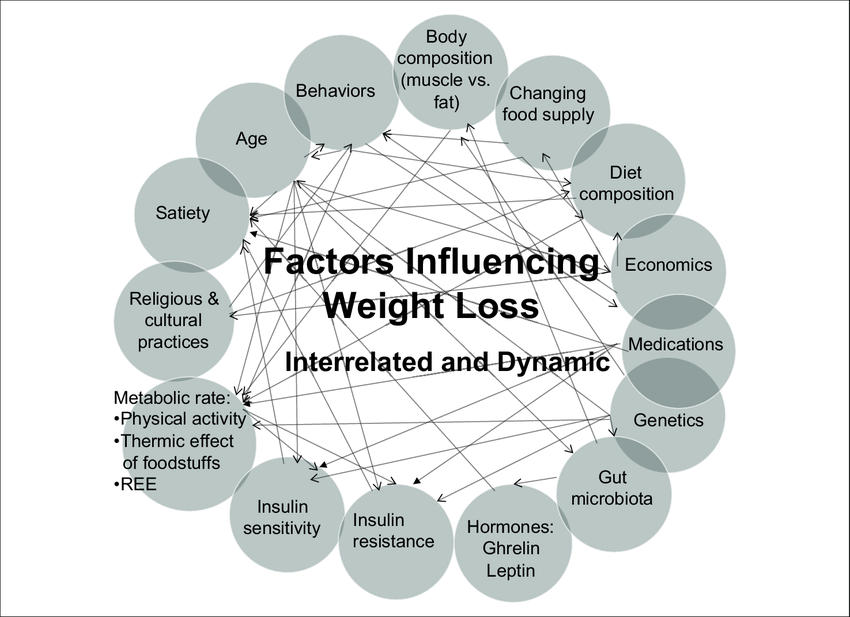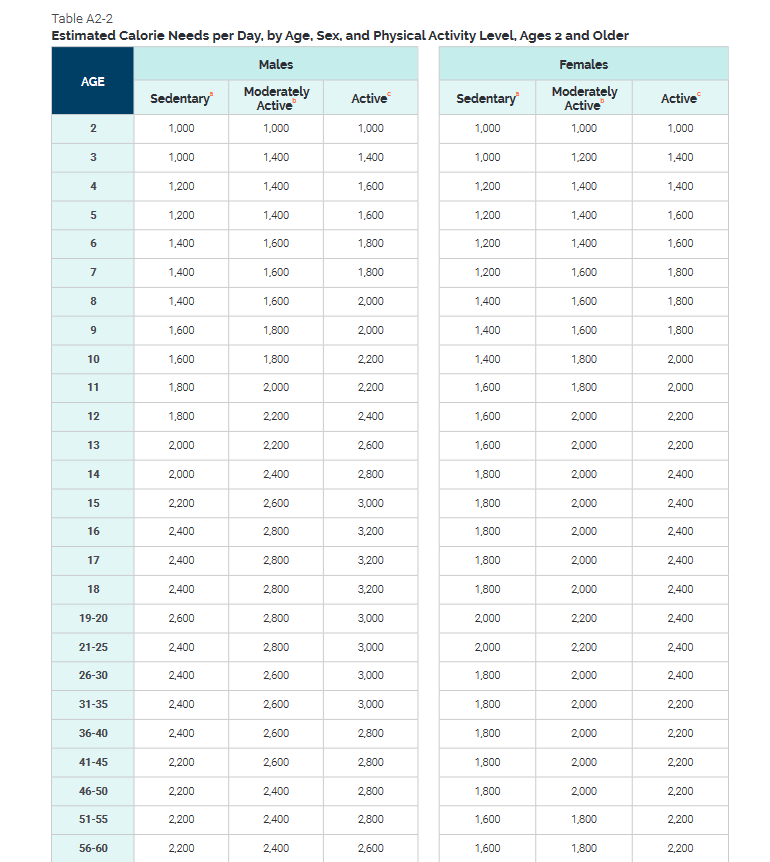
You can listen to the audio version of this article here.
We all know that carrying too much extra weight on your body is not good for your health. Overweight/obesity is associated with a higher risk of developing type 2 diabetes, heart disease, certain forms of cancer, obstructive sleep apnea, and problems with your weight-bearing joints.
Weight loss is one of those things that seems simple on the surface, yet can actually be quite complex when you dig into the science of all the factors that can affect a person's weight.

Seriously - how much you weigh is influenced by many more things than just diet and exercise. Source: Matarese and Pories 2014
In this article, I will discuss 3 factors that can make weight loss challenging, including:
Topic 1: The macronutrient composition of your diet, i.e. your macros, which impact satiation, hormones, metabolism, and more,
Topic 2: The effects of aging, which is something that we all have to face, if we’re lucky, and,
Topic 3: The effects of prescription drugs that are so common that you or someone you know is likely to be taking at least one of them.
Alright, let’s start by looking at macronutrients, known as macros for short.
Topic 1: Macros
The proportions of macronutrients in your diet affects your level of satiation. We have 3 macros – protein, carbohydrates (carbs), and fat. All 3 provide energy, but they each affect your body in unique ways.
Protein and fat tend to be more satiating than carbs. Therefore, if you have a higher proportion of these types of foods in your diet, you won’t need to eat as much food overall to feel satisfied. This is why it is best to go for something rich in protein and good fat when you feel hungry, both during meal times and those times when you just want a small snack. For instance, nuts plus fruit is more filling than fruit alone. Similarly, a platter of cheese and crackers is more satisfying than just crackers by themselves.

It's easy to inhale a bowl of chips because they mainly consist of carbs. If you were to fill that bowl with just protein, your body would literally stop you from eating more. More on that next.
When we eat protein, in sufficient amounts, a barrage of satiety hormones get sent to our brains to tell us that we are full. Among these hormones we have gastric inhibitory polypeptide (GIP), glucagon-like peptide-1 (GLP-1), cholecystokinin (CCK), and peptide tyrosine tyrosine (PYY). Carbs don’t do this. Instead, they make us want to keep eating, and eating, and eating. That's why it's easy to eat a whole box of cookies without even noticing.
By now, you understand that calories aren't everything when it comes to losing weight - the type of food providing those calories matters. Now, let’s take a look at research studies that have been done to see how people eating the same amount of calories can have different weight loss results, all depending on the ratio of protein to carbs to fat in their diets.
In a study by Pereira and colleagues, it was found that people who decreased their calorie intake by having less carbs instead of having less fat had an easier time losing weight and burning calories. The low carb group was also less hungry, experienced less inflammation, and had lower blood pressure. There are many studies (see this study and this combination of multiple studies) to back up this finding. Lowering carb intake – as opposed to lowering fat or protein intake - is the best thing that you can do for weight loss.
This isn't great news, I know. Carbs are probably the most delicious macro, and undisputedly the one that we are most tempted to overindulge in. So, why has nature played this cruel joke on us? Why does a diet that is relatively high in carbs make it harder to lose weight?

Why is one serving of ice cream less than a cup?
When we eat carbs, those carbs get broken down into sugar. It doesn't matter if it’s a piece of candy or a banana. All carbs get broken down into sugar. Now, when sugar enters your bloodstream, your pancreas gets a signal to produce insulin. Insulin is a hormone that many of the cells in your body need in order to use sugar for energy. It’s the key that opens the door to the cell. Insulin has another job too – and this is the important part - it tells your body to stop burning fat and to start storing it instead. Therefore, the result of consuming lots of carbs is that your body goes into fat storing mode instead of fat burning mode.
As I mentioned earlier, carbs also stimulate appetite. Think about it – have you ever been sitting in front of the TV and managed to scarf down 5 chicken breasts? Sounds crazy, right? How about 5 cookies? You have probably eaten twice that amount and still had room for dinner. The more carbs you eat, the more you want, because they do not satiate you. As a consequence, a diet that is full of refined carbs will make you more likely to eat too much, which is counterproductive for weight loss.
There is one more thing that I want to cover that relates to the topic of macros – the thermic effect of food. Basically, your body burns more calories when you give it certain foods to break down. Processed carbs are easy to break down, so you don’t really burn that many calories when you digest them. Protein, on the other hand, has a high thermic effect, meaning that your body has to work harder, i.e. burn more calories, just to digest it. This is a small part of why high-protein diets can be really effective for weight loss.
Okay, now let's move on to the next topic - the effects of Father Time on our bodies.
Topic 2: Aging
No matter what face cream and pill companies say, there is truly no way to halt aging – not yet at least. A solution to aging would have to be a solution to dying, and for better or for worse, there is no such thing in the present day.

Show me a cream that can make an 80 year old look like a 20 year old, then we can talk.
As you march towards the grave, your metabolism inevitably slows down as all of your systems decline in their efficiency and their ability to self-repair. You simply burn less calories as you age. You can slow down the decline, but the decline will happen. Because of this, we have to be careful to eat less as we age if we hope to maintain a healthy weight.
If you have been eating the same breakfast, lunch, and dinner for years, you will gain weight unless you adjust the portions as the years go by. If you’re in your 30s like me, you are likely experiencing this decline in your metabolic rate right now. In high school and in your 20s, you probably ate whatever you wanted and didn’t think too much about your weight. To be honest, that was me – I used to love mixing Doritos with popcorn and just downing bowls of that night after night. Nevertheless, at some point we have to adjust and accept that eating the way you did back when LMFAO was still making hits is a thing of the past.

No more party rocking, and no more inconsequential snacking. Sorry.
The USDA 2020-2025 Dietary Guidelines provide estimates for how much less you need to eat as you age. This will vary a lot from person to person, but you can take a look at the table below to give yourself a general idea of how your caloric needs will change over time.

Source: U.S. Department of Agriculture and U.S. Department of Health and Human Services. Dietary Guidelines for Americans, 2020-2025
Basically, your calorie needs are at their peak when you are in your late teens/early 20s. You need about 200 calories less once you are in your mid 20s, and 400 calories less when you hit your 40s. A large bagel with cream cheese can easily contain 400 calories, so just a simple shift in what you have for breakfast can be the difference between keeping your weight stable and gaining weight over time. In the same vein, strategies that you used to lose weight when you were 20 may not work when you are 50. You have to try new things and find what works for you in your current metabolic state.
Another reason why maintaining a healthy weight as you age can be challenging is that as the years go by, you will not be able to maintain the same physical stamina. Your activity level is going to be lower, so you will burn even fewer calories when you exercise. It is important to taper down the amount that you eat over time to adjust for this decline in the amount of calories that you burn.
Topic 3: Medications
Now, let’s move on to the last topic – medications that can make weight loss difficult. 50-85% of the US population uses at least one prescription drug. That means that you – or someone in your household – is likely taking a prescription drug. Unfortunately, some medications can make it harder to lose weight.
Please note that I am NOT encouraging you to stop taking a medication just because it may make weight loss more challenging - the sole purpose of this article is to inform. You could, of course, use this information to have a discussion with your healthcare provider about what your options are with respect to the health conditions that you may be dealing with.
Okay, now on to the list. The following medication classes have been associated with weight gain:
Antipsychotics, which may be indicated for conditions like schizophrenia or bipolar disorder, for example clozapine and olanzapine,
Antidepressants, used to manage depressive symptoms, for example, amitriptyline and nortriptyline,
Antihyperglycemics, used to control blood sugar, for example, pioglitazone and rosiglitazone,
Corticosteroids, which are prescribed for asthma, autoimmune diseases, and other conditions, for example prednisone and cortisone,
All in all, if you are having trouble with losing weight, it may be because you need to look at your macros, adjust your eating and exercise habits as you get older, and/or have a conversation with your medical provider about the side effects of the medications that you are taking.
Learned anything new? Then share this article!
Enjoy today.
References:
Topic 1: Macros
Matarese LE, Pories WJ. Adult weight loss diets: metabolic effects and outcomes. Nutr Clin Pract. 2014 Dec;29(6):759-67. doi: 10.1177/0884533614550251. Epub 2014 Oct 7. PMID: 25293593.
Morell, P., & Fiszman, S. (2017). Revisiting the role of protein-induced satiation and satiety. Food Hydrocolloids, 68, 199-210.
Pereira MA, Swain J, Goldfine AB, Rifai N, Ludwiget DS. Effects of a low–glycemic load diet on resting energy expenditure and heart disease risk factors during weight loss. J Am Med Assoc. 2004;292:2482-2490.
Lydia A. Bazzano, Tian Hu, Kristi Reynolds, et al. Effects of Low-Carbohydrate and Low-Fat Diets: A Randomized Trial. Ann Intern Med.2014;161:309-318. [Epub 2 September 2014].
Chawla S, Tessarolo Silva F, Amaral Medeiros S, Mekary RA, Radenkovic D. The Effect of Low-Fat and Low-Carbohydrate Diets on Weight Loss and Lipid Levels: A Systematic Review and Meta-Analysis. Nutrients. 2020; 12(12):3774.
Ludwig DS, Ebbeling CB. The Carbohydrate-Insulin Model of Obesity: Beyond "Calories In, Calories Out". JAMA Intern Med. 2018 Aug 1;178(8):1098-1103. doi: 10.1001/jamainternmed.2018.2933. PMID: 29971406; PMCID: PMC6082688.
Paula J. Geiselman, Donald Novin. The Role of Carbohydrates in Appetite, Hunger and Obesity,
Appetite, Volume 3, Issue 3, 1982, Pages 203-223, ISSN 0195-6663.
Tappy L. Thermic effect of food and sympathetic nervous system activity in humans. Reprod Nutr Dev. 1996;36(4):391-7. doi: 10.1051/rnd:19960405. PMID: 8878356.
Topic 2: Aging
U.S. Department of Agriculture and U.S. Department of Health and Human Services. Dietary Guidelines for Americans, 2020-2025.
Topic 3: Medications
Martin CB, Hales CM, Gu Q, Ogden CL. Prescription Drug Use in the United States, 2015-2016. NCHS Data Brief. 2019 May;(334):1-8. PMID: 31112126.
Wharton S, Raiber L, Serodio KJ, Lee J, Christensen RA. Medications that cause weight gain and alternatives in Canada: a narrative review. Diabetes Metab Syndr Obes. 2018 Aug 21;11:427-438. doi: 10.2147/DMSO.S171365. PMID: 30174450; PMCID: PMC6109660.

Comments